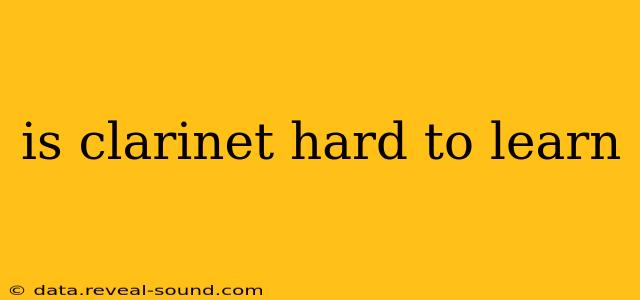The clarinet, with its rich, expressive tone, is a popular instrument for beginners and experienced musicians alike. But the question on many minds is: is clarinet hard to learn? The answer, like many things in life, is nuanced. It depends on several factors, including your musical background, your dedication to practice, and your individual learning style.
While not inherently easy, the clarinet isn't impossibly difficult either. With consistent effort and the right approach, anyone can learn to play. Let's explore this further.
What Makes the Clarinet Challenging?
Several aspects of clarinet playing can present initial hurdles:
-
Embouchure: Developing the correct mouth position (embouchure) is crucial for producing a clear, consistent tone. This takes time and practice to master. Initially, you might experience discomfort or fatigue in your mouth and facial muscles.
-
Fingerings: The clarinet's fingering system, while not overly complex, requires precision and coordination. Initially, you'll need to memorize numerous finger combinations for different notes and keys. The slightest variation in fingering can dramatically affect the sound produced.
-
Reed Management: Clarinets use reeds, which are delicate and require careful maintenance. Learning to select, prepare, and care for reeds is essential for producing a good tone. A damaged or improperly prepared reed can make playing frustrating.
-
Breath Control: Effective breath control is vital for producing a full, resonant sound and maintaining consistent volume and tone. This is a skill that develops gradually with practice and conscious effort.
What Makes the Clarinet Relatively Easy?
Despite the challenges mentioned above, several factors contribute to the clarinet's relative accessibility:
-
Abundant Resources: Numerous learning materials are available, including instructional books, online tutorials, and apps. These resources can greatly aid the learning process.
-
Supportive Community: A strong community of clarinet players exists, offering support, advice, and encouragement to beginners.
-
Gradual Progression: Most clarinet methods start with simple exercises and gradually introduce more complex techniques. This allows learners to build a solid foundation before tackling challenging passages.
How Long Does it Take to Learn Clarinet?
The time it takes to learn clarinet varies significantly depending on factors such as:
-
Frequency and duration of practice: Consistent, dedicated practice is crucial. Even short, focused sessions are more effective than infrequent, lengthy ones.
-
Learning style and aptitude: Some individuals grasp musical concepts more quickly than others.
-
Quality of instruction: A skilled teacher can significantly accelerate the learning process.
Generally, a beginner can expect to learn basic notes, scales, and simple songs within a few months of consistent practice. Mastering more advanced techniques, such as articulation and vibrato, takes considerably longer—potentially years of dedicated practice.
Is it Harder to Learn Clarinet Than Other Instruments?
Compared to some instruments, the clarinet presents unique challenges. For example, the embouchure and reed management can be more demanding than instruments like the recorder or piano. However, compared to instruments like the violin or cello, the technical demands of the clarinet might be considered less physically strenuous. Ultimately, the "hardness" is subjective and depends on the individual's skills and preferences.
What Age is Best to Start Learning the Clarinet?
There's no single "best" age to start learning the clarinet. Children as young as eight or nine can begin, provided they possess the necessary hand coordination and attention span. However, adults can also learn successfully, often benefiting from greater self-discipline and a more mature understanding of musical concepts.
Can I Learn Clarinet by Myself?
While self-teaching is possible, it is generally recommended to learn from a qualified teacher. A teacher can provide personalized instruction, correct bad habits early on, and offer valuable feedback to accelerate progress. Self-teaching can be limiting, and without guidance, you might develop incorrect techniques that are difficult to unlearn later.
In conclusion, while the clarinet presents some challenges, its rewards—the ability to create beautiful music and express yourself—make the learning journey worthwhile. With dedication, the right resources, and possibly a good teacher, learning the clarinet is an achievable and fulfilling experience.
